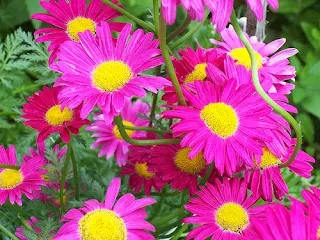Killer Daisy Growers in Tanzania, Kenya and Rwanda
The Pyrethrum daisy, with its potent insecticidal properties and wide range of applications, has been an important natural resource in the fight against pests and insects. Its effectiveness, coupled with its relatively low toxicity and environmental impact, has made it a popular choice for both agricultural and domestic pest control.
The Pyrethrum daisy flower is a natural insecticide flower that thrives at high altitudes, grows in volcanic soil and grows in many of the most interesting places in East Africa's Rwanda, Kenya and Tanzania. The Pyrethrum daisy is a perennial herbaceous plant that grows up to 60 centimeters in height. It features finely divided, fern-like leaves that are grayish-green in color. The flowers are daisy-like with white petals and a yellow center. They are arranged in clusters at the top of long stems.
The Pyrethrum daisy produces natural insecticides called pyrethrins in its flowers. Pyrethrins are potent insecticidal compounds that effectively repel and kill a wide range of pests, including mosquitoes, flies, fleas, and moths. They act by disrupting the nervous systems of insects, leading to paralysis and eventual death.
To extract pyrethrins, the flowers of the Pyrethrum daisy are harvested and dried. The dried flowers are then crushed or ground to a fine powder. This powder contains the active pyrethrin compounds, which can be further processed and formulated into insecticidal sprays, powders, or other forms for commercial use.
SC Johnson Company substantially increased its purchase of pyrethrum from Rwanda’s 15,000 farmers who harvest chrysanthemum flowers for pyrethrin in the Ruhengeri area of Rwanda.
In Kenya, MGK, an accounting and auditing firm licensed the extraction and refining technology to the Pyrethrum Board of Kenya, PBK who collects flowers from growers in several regions in Kenya. In Tanzania, the pyrethrum industry is under operation of a private company Pyrethrum Company of Tanzania, PCT which MGK is its majority owner.
Producers in East Africa, mainly Tanzania, Kenya and Rwanda succeed in growing the pyrethrum flower because the unique plant thrives at high altitudes and in volcanic soil.
Together we build awareness that boost harmony, education, and success, below are more links to articles you will find thought provoking.
- Historical African Country Name
- Top 20 Largest Countries in Africa
- How many countries does Africa have?
- Roots of Africanized Christianity Spiritual Songs
- Paying Money To Tour Slums in Africa
- Awesome Kenyan Woman
- Land is Not For Women in Sierra Leone
- African Kente Cloth Facts
- Accra the Ghanaian Capital Ultimate Mall Experience







